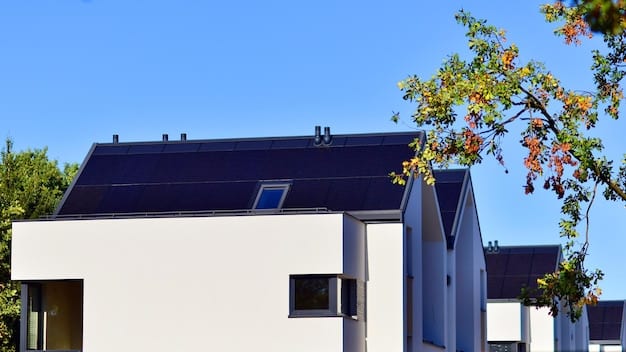Solar Water Heating: Your Sustainable Hot Water Solution

Solar water heating offers a sustainable and cost-effective method for heating water, reducing reliance on traditional energy sources and lowering your carbon footprint.
Looking for a way to reduce your energy bills and minimize your environmental impact? Solar water heating may be the perfect solution. Harnessing the sun’s energy to heat your water is a sustainable and cost-effective alternative to traditional water heating methods.
Understanding Solar Water Heating Systems
Solar water heating systems offer an environmentally conscious way to warm your water supply. These systems use sunlight to heat water, decreasing your reliance on conventional energy sources such as electricity or gas.
The technology behind solar water heating is straightforward, yet remarkably efficient. By capturing solar radiation and converting it into heat, these systems provide a sustainable hot water solution.
How Solar Water Heating Works
Solar water heating systems consist primarily of solar collectors, a storage tank, and a circulation system. The collectors absorb sunlight, which heats a working fluid. This fluid then transfers the heat to water stored in the tank.
Types of Solar Water Heating Systems
- Active Systems: These systems use pumps to circulate water or a heat-transfer fluid through the collectors and into the storage tank.
- Passive Systems: Utilizing natural convection, passive systems eliminate the need for pumps and are often more cost-effective.
- Batch Systems: Also known as ICS (Integrated Collector Storage) systems, these heat water directly in the collector and require no separate storage tank.
Choosing the right type of system depends on factors such as climate, hot water demand, and budget. Each type offers distinct advantages and can be tailored to meet specific needs.
In summary, understanding the components and types of solar water heating systems is crucial for making an informed decision. These systems effectively reduce energy consumption and promote environmental sustainability.
Benefits of Switching to Solar Water Heating
Switching to solar water heating offers a multitude of benefits, ranging from significant cost savings to a reduced environmental impact. These advantages make solar water heating an attractive option for homeowners looking to go green and save money.
The long-term benefits often outweigh the initial investment, leading to substantial savings and a smaller carbon footprint.

Cost Savings
One of the most compelling benefits is the potential for significant cost savings on energy bills. By harnessing the sun’s free energy, homeowners can greatly reduce their reliance on traditional energy sources.
Environmental Impact
Solar water heating is an environmentally friendly alternative that reduces greenhouse gas emissions. By using a renewable energy source, you can decrease your carbon footprint and help combat climate change.
- Reduced Carbon Footprint: Lowering your dependence on fossil fuels helps reduce overall carbon emissions.
- Renewable Energy Source: Sunlight is a virtually limitless resource, making it a sustainable choice.
- Decreased Pollution: Fewer emissions mean less air and water pollution.
By choosing solar water heating, you’re contributing to a healthier planet and promoting a more sustainable future.
In conclusion, switching to solar water heating provides both environmental and economic benefits. These advantages make it a smart and sustainable choice for any homeowner.
Installation and Maintenance of Solar Water Heaters
Proper installation and maintenance are essential for ensuring the long-term efficiency and reliability of solar water heating systems. Understanding these aspects can help homeowners make informed decisions and avoid potential issues.
While professional installation is often recommended, basic maintenance can be handled by homeowners to keep their systems running smoothly.
Professional Installation
Hiring a qualified installer is crucial for ensuring the system is properly set up and optimized for your specific location and needs. Professional installers have the expertise to assess your site and recommend the best system and placement for maximum efficiency.
Routine Maintenance
Regular maintenance can prolong the life of your system and maintain its efficiency. This includes checking for leaks, cleaning the collectors, and ensuring proper system operation.

- Regular Inspections: Check for any signs of damage or leaks.
- Collector Cleaning: Remove any debris or buildup on the collectors to ensure optimal sunlight absorption.
- System Checks: Verify that all components are functioning properly, including pumps and valves.
By prioritizing installation and maintenance, you can enjoy the long-term benefits of solar water heating and minimize potential issues.
Ultimately, the longevity and efficiency of a solar water heater depend on skilled installation and consistent upkeep, ensuring it continues to provide sustainable hot water for years to come.
Cost Analysis: Is Solar Water Heating Worth It?
Evaluating the long-term cost-effectiveness of solar water heating requires a comprehensive analysis that considers initial investment, potential savings, and available incentives. This assessment helps homeowners determine if solar water heating is a worthwhile investment for their specific situation.
While the upfront costs may seem daunting, the long-term savings and environmental benefits can make solar water heating a financially sound decision.
Initial Investment
The initial cost of a solar water heating system includes the purchase of the system, installation fees, and any necessary upgrades to your plumbing or electrical system. These costs can vary depending on the type of system and the complexity of the installation.
Long-Term Savings
Over time, solar water heating systems can generate significant savings on energy bills. By reducing your reliance on traditional energy sources, you can lower your monthly expenses and potentially increase your home’s value.
- Reduced Energy Bills: Lower your monthly expenses by using free solar energy.
- Increased Home Value: Solar water heating can be an attractive feature for potential buyers.
- Government Incentives: Take advantage of rebates and tax credits to offset initial costs.
Taking into account all factors, a well-maintained solar water heater provides a strong return on investment, particularly when factoring in environmental responsibility.
In summary, carefully weighing the costs and benefits will determine whether solar water heating is a wise investment for your needs. Financial incentives and long-term savings often make it a financially sound option.
Solar Water Heating and Home Value
Integrating solar water heating into your home not only contributes to environmental sustainability but can also significantly enhance your property’s market value. The appeal of energy-efficient homes is growing, making solar water heating a valuable asset.
Many potential buyers are drawn to features that reduce utility bills and promote eco-friendliness, positioning homes with solar installations favorably in the real estate market.
Increased Appeal to Buyers
Homes equipped with sustainable energy solutions like solar water heaters often attract a larger pool of potential buyers. This is particularly true for environmentally conscious individuals who prioritize green living.
Potential for Higher Resale Value
Solar water heating systems can potentially increase your home’s resale value. Buyers often see these systems as a long-term investment that will save them money on energy bills.
- Attract Eco-Conscious Buyers: Appeal to a growing segment of the market concerned about sustainability.
- Highlight Energy Efficiency: Showcase the reduced utility costs as a major selling point.
- Boost Property Value: Enhance your home’s overall market value with an eco-friendly upgrade.
Adding solar water heating is a forward-thinking decision that can boost your lifestyle and the financial profile of your property, ensuring it stands out in a competitive market.
In essence, solar water heating is a practical upgrade that pays dividends by increasing your home’s value and attracting buyers who value sustainability.
Future Trends in Solar Water Heating Technology
The future of solar water heating technology is promising, with ongoing innovations aimed at increasing efficiency, reducing costs, and expanding applications. Staying informed about these trends can help homeowners make smart choices for their energy needs.
Advancements in materials, system design, and integration methods are paving the way for more effective and accessible solar water heating solutions.
Technological Advancements
Ongoing research and development are leading to more efficient and cost-effective solar collectors. New materials and designs are improving the performance and durability of these systems.
Smart Home Integration
Integrating solar water heating systems with smart home technology allows for greater control and optimization of energy usage. This includes monitoring performance, adjusting settings, and even predicting hot water demand.
- Improved Efficiency: New materials and designs boost performance.
- Smart Monitoring: Use smart home technology to optimize energy usage.
- Expanded Applications: Solar water heating is being adapted for a wider range of uses.
Being aware of these evolving trends ensures homeowners can take advantage of new developments, maximizing the potential of solar water heating as a reliable energy source.
Overall, future trends in solar water heating focus on making the technology more efficient, affordable, and user-friendly, ensuring its continued relevance as a sustainable energy solution.
| Key Point | Brief Description |
|---|---|
| ☀️ Cost Savings | Reduces energy bills by using solar energy to heat water. |
| 🌱 Environmental Impact | Lowers carbon footprint by utilizing renewable solar energy. |
| 🏠 Home Value | Increases property value by adding an energy-efficient feature. |
| 🛠️ Maintenance | Regular checks ensure optimal system performance and longevity. |
Frequently Asked Questions
Solar water heating systems use solar collectors to absorb sunlight, which heats a working fluid. This fluid then transfers the heat to water stored in a tank, providing hot water for your home.
There are primarily two types of systems: active and passive. Active systems use pumps to circulate fluids, while passive systems rely on natural convection. Batch systems heat water directly in the collector.
Savings vary depending on your location, energy consumption, and the system type, but many homeowners see a significant reduction in their energy bills, often recouping their investment over time.
Yes, solar water heating can be effective in various climates. Systems in colder regions may require additional insulation and freeze protection, but they can still significantly reduce energy costs.
Regular maintenance includes checking for leaks, cleaning the collectors, and ensuring all components are functioning correctly. Professional inspections are also recommended to ensure long-term efficiency and reliability.
Conclusion
Adopting a solar water heating system presents a viable and responsible method for homeowners to minimize their carbon footprint and reduce utility expenses. With benefits spanning from environmental responsibility to long-term cost savings, it’s clear that solar water heating is not just a trend, but a sustainable solution for the future.





